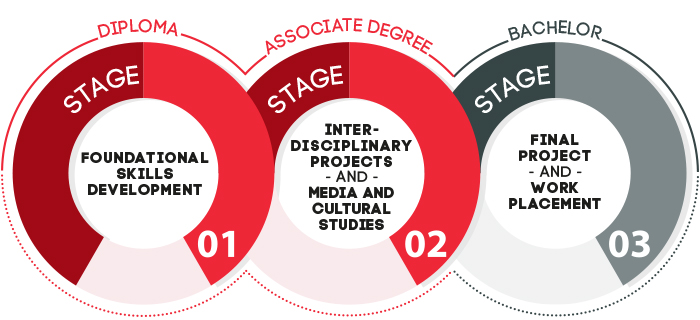Minimum Age
International students need to provide additional evidence of language skills including one of the following:
In the Associate Degree, you will complete the first four trimesters of the Bachelor of Games Development, which consists of six trimesters. This will prepare you to enter the workforce as a highly skilled para-professional employee. The Associate Degree is also designed an excellent pathway into the Bachelor of Games Development.
At SAE you won’t find yourself in a lecture with 300 people or even in a traditional lecture at all. You’ll be in a studio environment using industry-standard software like Unreal Engine 4, Unity3D, Autodesk 3D Studio Max and Maya, developing for technologies such as Oculus Rift, HTC Vive, Android, and iOS.
Your growth and development will be assessed through the completion of industry-based projects, not theoretical based essays. This will ultimately help you build up a body of work and portfolio to share with potential employers or first client.
In preparation for an industry that commands agility and adaptability, you’ll cut your creative teeth on projects initially in partnership with your course peers. As your skills develop and you work on more dynamic projects, you’ll apply your capabilities on cross-discipline projects.
For those wanting to go the extra, and thousands of miles, you can complete up to two trimesters of your course at selected SAE campuses across the planet. Suddenly, real-world experience just went worldwide.
Basically, your epic adventure in gaming starts here.
The Associate Degree of Games Development program is broken up into discrete stages, each designed to promote different skills.
Stage I – Foundational Skills Development
In Stage I, students will undertake a number of foundational units which will give students the essential technical skills and knowledge not only relevant to the chosen discipline area, but also give students the skills required to collaborate with other creative media students and professionals in later stages of the Games course.
Stage II – Interdisciplinary Projects, Media and Cultural Studies
In Stage II we show students how their work in Games contributes to and interacts with broader culture and media practice. This knowledge will enable students to work with a variety of other disciplines and artists and expand their potential on the global stage.
Students will complete a number of real-world projects with students not only in their own discipline, but also in all other SAE disciplines.
Stage II has three studio modules with projects based on the following areas;
1. Games Programming
The SAE Games Programming degree is a highly focused program that delves deep into game-play and game engine programming. Students will build skills in existing software packages and frameworks such as Unreal Engine and Unity, to build technical skillset and develop game tools, libraries and engines. Students will also enhance their knowledge of C++ and object-oriented programming to build complex games and tools. Throughout the program, students will cross-collaborate from all other disciplines to build a rich and high quality portfolio of work.
2. Games Design
In the Game Design specialisation students will work on a range of projects with peers and SAE Facilitators, which will build skills and knowledge within the diverse scope of Game Design.
During the program students will be able to pursue all facets of Game Design such as level design, systems design, economy design, combat and AI design, balancing, player psychology and much more. Best of all, SAE will provide the tools to be able to articulate design ideas into real working games, explore complex artistic ideas that lead to original, personal games that are artistically and meaningful to the student. Students have the opportunity to work alongside other like-minded students and staff from all SAE disciplines to build a massive portfolio of projects.


